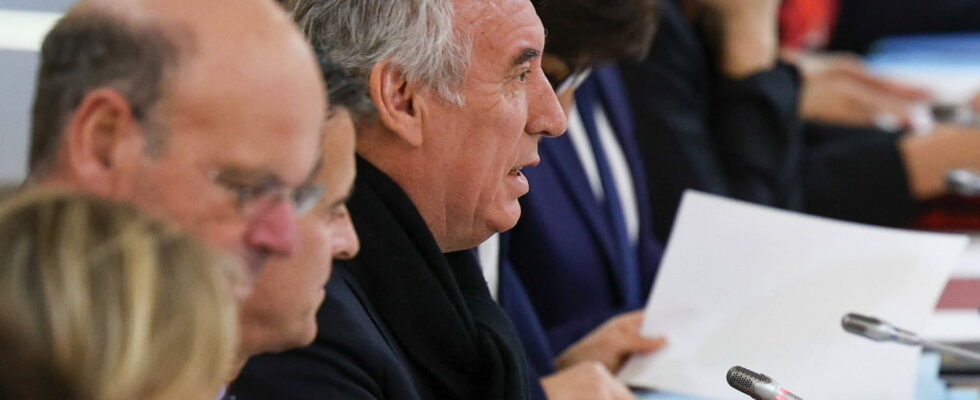Prime Minister François Bayrou will deliver his general policy speech to Parliament this Tuesday, January 14. Wishing to avoid censorship, he should seek compromise and take into account consultations with the opposition.
François Bayrou is preparing to face the National Assembly. If he already faced the deputies during a “question to the Prime Minister” session in mid-December when his government was not yet formed, during his next appearance in the hemicycle, on Tuesday January 14 , he will deliver his general policy speech. At the same time a minister will read the same declaration in front of the Senate. The moment will be crucial, because his ability to resist a motion of censure will depend on the declarations of the head of government. The elected representatives of La France insoumise have already announced that they have submitted a motion of censure which they hope to be able to vote on January 16, but others like those of the National Rally are waiting to listen to the Prime Minister to find out whether or not they will do so. censor.
François Bayrou’s objective is therefore clear: to avoid censorship. Especially since several commentators are banking on the government’s handover during the winter and doubt its ability to last longer than the three months of life expectancy of Michel Barnier’s executive. For this, the Prime Minister wants to be sure of his move and writes his own speech according to BFMTV. He wants to propose a method capable of reaching compromises, to avoid censorship, according to a “horizontal, concrete, collective” strategy.
Logically, François Bayrou’s general policy speech should therefore be inspired by his exchanges with the political forces and economic and social partners who succeed one another at Matignon, as well as in several ministries, notably Bercy, for a series of consultations. According to a relative of Béarnais at BFMTVthe speech must reflect consultations with “political forces, territories, elected officials, and the aspirations of the French”.
The 2025 budget during the consultations and Bayrou’s speech
François Bayrou, who has already started writing his speech, should not finalize it before Tuesday morning, with the consultations only due to end a few hours before his meeting with Parliament. It must be said that the topics of discussion are numerous: the Prime Minister consults the social partners on pensions; the Ministry of the Economy is in discussion with opposition parties concerning the 2025 budget and the Ministry of Health must meet with a view to the Social Security financing bill (PLFSS). Three issues which will undoubtedly be mentioned in François Bayrou’s speech on January 14.
Arbitrations concerning the 2025 budget should also occupy a lot of space since the situation is still delicate and the oppositions are entrenching their positions. The Prime Minister and his government, who have decided to start again from the copy of Michel Barnier, however seem to have decided on a few points: they want to maintain recruitment in the justice system, the establishment of a tax on share buybacks, the exceptional contribution of large businesses and the wealthiest households as well as the fight against over-optimization. Conversely, they exclude tax increases for the middle class or an increase in VAT. And a little novelty: there would be a question of a “sacred” budget for key ministries such as Defense, Justice, Education and Ecological Transition.
Agricultural crisis, institutions and immigration?
Besides the budget, other subjects should be invited to Parliament according to BFMTV : the agricultural crisis, institutional reforms such as the accumulation of mandates or the establishment of proportional representation in legislative elections. The Prime Minister could also clarify his policy on immigration since the executive would consider measures in this area, particularly for Mayotte. “Anyone who claims that there is not a burning immigration problem in Mayotte would be irresponsible,” declared François Bayrou during his trip to Mayotte, recalling having supported the abolition of land rights in Mayotte in 2007. Is this measure in the drawers?
The Prime Minister seems to judge the measures necessary in Mayotte, without specifying which ones. And several ministers are of the same opinion such as Bruno Retailleau (Interior), Manuel Valls (Overseas) and Sébastien Lecornu (Armies) who call for an immigration bill in a forum at the Figaroin particular to regulate the situation in Mayotte. Gérald Darmanin, Minister of Justice, is also in favor of such a project and even supports a new restriction of land law. Other ministers, on the contrary, believe that such a radical measure is not the right solution, like Elisabeth Borne, especially since in Mayotte land rights are already arranged differently than on metropolitan soil.
On this question of immigration, and of land law in particular, the reflection of which could extend to all French territories according to BFMTVthe Prime Minister will have to pay attention to everyone’s opinions. If the RN is favorable and supports a hardening of the rights of the soil in Mayotte and elsewhere, the left is conversely less enthusiastic, even opposed, to this idea. Whether he goes in this direction or abandons the idea, François Bayrou risks pushing part of the opposition to vote for censure. But the path to compromise could be difficult to find here too.
